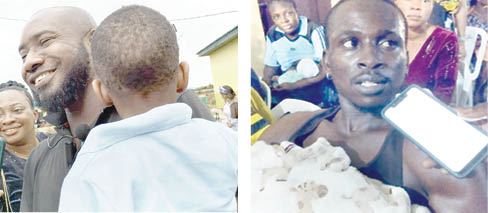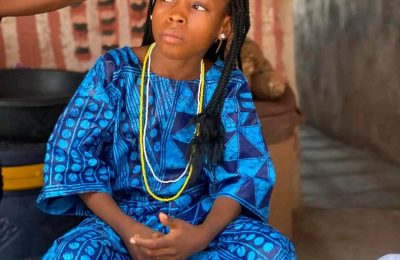
MR Victor Falaitar was seen in a sleeveless shirt, a pair of shorts and an ear stud holding his new baby at the Badore Primary Healthcare Centre in Eti Osa Local Government of Lagos State. He had joined a multitude of nursing mothers to have his baby receive the BCG vaccine to protect him from tuberculosis.
His baby was delivered at 6.30am, and the mother, because of the rigour of childbirth, was still recuperating at the lying ward of the healthcare centre.

“His mother is doing well and in the lying ward, taking a drip. She cannot step out, and since I am around, I brought the baby for his first immunisation,” said Mr Falaitar, who has been in the hospital all through the period of his baby’s delivery.
The 31-year-old Falaitar, who works as a personal trainer, yoga coach, and massage therapist, added, “I couldn’t sleep all through the night; it was around 11pm when the labour started, and till now I have not closed my eyes. I thank God the baby is here; he is strong and healthy.”
Mr Emmanuel Uchenna, who deals shoes, exclusive handmade footwear, and accessories made with the most exotic and high-quality leathers, was also at the PHC with his two sons for immunisation.
Holding his son, Mr Uchenna said it is good for fathers to follow up on immunisation of their children and visit the clinic with their wives for better understanding of their health and to see what their wives go through during such visits.
“I brought my two sons for immunisation. It is good for fathers to be at the healthcare centres to follow the health talks and see what their wives go through,” he said. “It is fun for me. This is not my first time anyway; I was here for my son’s immunisation some week’s back. I wish that all fathers will do similar.”
Men’s involvement in reproductive, maternal, newborn, and child health is crucial. They are the key decision-makers in the family and play a crucial role in partners’ reproductive health in Nigeria due to several factors, which include culture, religion, ignorance, and socio-economic issues.
When men are excluded from reproductive, maternal, newborn, and child health or only participate in a limited way, it is a lost opportunity for the whole family.
Mr Emmanuel Uchenna and Mr. Victor Falaitar are examples corroborating the inclusion of men in reproductive, maternal newborn, and child health as a promising strategy for increasing vaccination overage, boosting herd immunity against vaccine-preventable diseases, and ensuring healthier mothers and children.
Nigeria remains home to 2.3 million children that have not received any lifesaving vaccines and are at risk of vaccine-preventable infections, even death.
Celine Lafoucriere, Chief of UNICEF Field Office for Southwest States, in Lagos State, at a two-day media dialogue to enhance routine immunisation and to reduce the prevalence of zero-dose children, said these children without vaccination are particularly children in marginalised areas and hard-to-reach areas in Nigeria.
“It is unfortunate and very sad news that we are still having very pressing challenges in Nigeria, with 2.3 million children still havingn’t received vaccines at all. Vaccines remain central to their health and a fundamental right of every child and remain fundamental in improving health outcomes and reducing inequality,” she declared.
The benefits of immunisation are numerous. Vaccines protect individuals from deadly diseases such as polio, measles, and hepatitis. They help prevent outbreaks and ensure community immunity, where the majority of the population is immunised, thereby providing indirect protection to those who cannot receive vaccines due to medical reasons.
Besides, immunisation is a key component in achieving public health objectives and reducing healthcare costs, as it prevents the need for expensive treatment for preventable diseases.
“Many parents are still reluctant to bring their children for vaccination. We need to ensure that parents are aware of the vaccination schedule and understand the importance of adhering to it,” said Chinyere Osunlana, the chief nursing officer at the Badore PHC centre.
She said that at Badore PHC Centre, like many other comprehensive primary healthcare centres in Lagos, mechanisms are in place to ensure no stockout of vaccines, children can be vaccinated every day of the week, including Sunday, and they have effective vaccines since each centre has a solar-powered vaccine fridge.
However, there are still delays or refusals to vaccinate children by parents that put them at risk of severe diseases and even death.
Aderonke Akinola-Akinwole, a Social and Behaviour Change Specialist at UNICEF, said myths and misinformation about vaccines also present barriers to achieving high immunisation coverage. Some parents believe that vaccines have side effects that could harm their children, while others distrust health systems entirely.
Also, the Assistant Immunisation Programme Officer, Lagos State Primary Health Care Board, Dr Adebayo Adeniji, declared that cases of people that have not received any form of vaccination at all, particularly the migrant population and marginalised youth, are becoming rampant and a thing of concern in Nigeria.
Dr Adeniji declared that unvaccinated people pose health risks and therefore the need for the adoption of interventions that can ensure equitable access to vaccination so that no child is left behind.
The substantial disparities in the immunisation coverage between hard-to-reach populations and the general population, he said, have also made the adoption of targeted interventions and technologies to ensure equitable access to vaccination for all children imperative.
“What are the plans to actually cover these gaps? In Lagos State, we have mobile vaccination teams. We have outreach teams that are paid to go to outreach facilities to vaccinate people at least once a week.
“The Lagos State government, for example, has put forward a policy that every community within the state should look inward and at least get somebody from the community that can be used as a community health worker to serve their health.
“We are also talking about technology-based interventions like deploying what is called a vaccination tracker. It will help us to track people that are not coming and also for parents and individual users to receive reminders on when vaccination appointment dates.
“Also, the advocacy, communication, and social mobilisation (ACSM) go to stakeholders to engage and sensitise them about activities, not only immunisation activities but also general primary health care services in the state.”
On increased involvement of men in reproductive, maternal, newborn, and child health, Dr Adeniji said it is important that everybody, regardless of gender, sees health as their responsibility and not just a gender role.
He said that male involvement in reproductive, maternal, newborn, and child health is gradually gaining traction in Nigeria because more men also want to be involved in their family care, including their unborn babies.
“Currently, we introduced group antenatal care for mothers. They come together and discuss what they are passing through, and they can also learn from one another with coordination by a health worker.
“Gradually, we are introducing the father’s group antenatal care so that the husbands can also be included during specific key points during the antenatal process. This is done in other climes. The policy on this is in the pipeline, and it lets men also be more involved in their family care, including the unborn baby.”
Dr Adeniji said that men are the only ones that can take certain decisions in some circumstances, and bringing them in from the beginning helps them to understand the importance of steps to be taken in care of their families and why decisions on some conditions cannot wait a long time for them to make.
“The plan is to make it a group for them to get their involvement; issues can be raised and discussed to enlighten them. The policy document and guideline for its implementation in Lagos State have been developed but are awaiting implementation,” he stated.
“They will be able to understand that certain steps might eventually not even be able to wait for their decisions regarding some health conditions; they are aware of what it entails to ensure that everybody is healthy and the high burden of deaths of women and their children stops drastically in our environ.
“In reality, reducing the high burden of deaths of women and children should involve the effort of everybody, including the family in general, and not just the responsibility of the mother-to-be and the health workers,” he declared.
However, this strategy will need that reproductive, maternal, newborn, and child health services be offered at hours and on days when men can attend as well. For instance, the services could be available over the weekend or later in the evening. The design and delivery of services should be done with men in mind.
Read Also: Lagos govt commits to inclusive opportunities for youths







